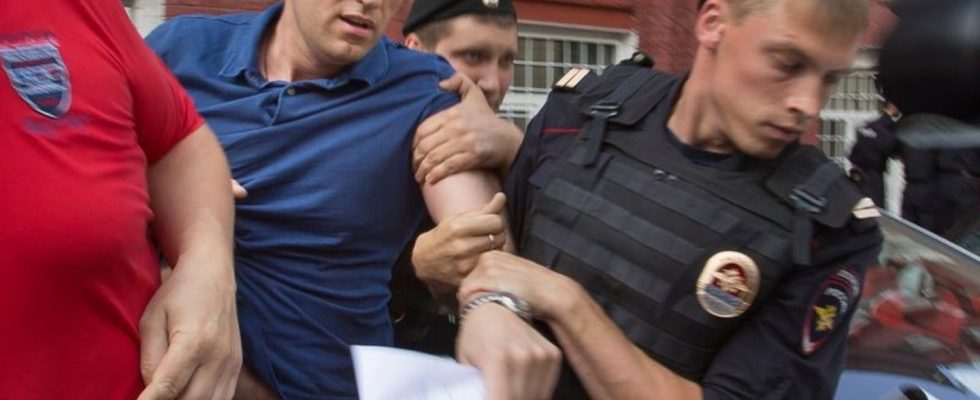There is sadness and dismay around the world following the death of imprisoned Kremlin critic Alexei Navalny. Meanwhile, the Russian authorities continue to keep the 47-year-old’s body under lock and key.
Even two days after the death of Kremlin critic Alexei Navalny, the relatives have not yet been given access to the body. According to civil rights activists, more than 12,000 people in Russia called for the body of the politician, who died in a Siberian prison camp, to be handed over to his relatives.
The civil rights platform OWD-Info only started the petition late on Saturday afternoon. The release must take place quickly, the statement says: “At least after his death, Alexei Navalny should be with his relatives.”
According to Russian authorities, Navalny, who was physically weakened after many days in repeated solitary confinement, collapsed on Friday while walking in the courtyard of his Siberian prison camp in freezing temperatures. According to the prison service, attempts at resuscitation were unsuccessful. Navalny was only 47 years old at the time of his death.
Human rights activists accuse the Russian power apparatus of murder. The prominent anti-corruption campaigner’s employees also assumed that Navalny was deliberately killed.
Novaya Gazeta: Navalny’s body lies in Salekhard
Meanwhile, Novaya Gazeta, which was closed by the authorities in Russia and then reopened abroad, reported, citing its own sources, that Navalny’s body was being kept in the district hospital in the city of Salekhard in the far north of Siberia. An autopsy had not yet taken place, at least as of Saturday. In addition, the dead man’s body is said to have bruises.
Salekhard is the capital of the Yamal-Nenets Autonomous Okrug. The “Polar Wolf” prison camp, where Navalny died, is about 50 kilometers northwest of it as the crow flies – already beyond the Arctic Circle.
Novaya Gazeta quotes an anonymous employee of the emergency service. According to him, the bruises show that Navalny had convulsions before his death and was held by judicial staff. A bruise on the chest is also an indication that resuscitation attempts have actually been made. However, the newspaper report shows that the informant himself did not see Navalny after his death, but was only informed about his condition by colleagues.
The information could not initially be confirmed. There was no official information about the whereabouts of the dead man over the weekend.
His mother Lyudmila Navalnaya had only received news of her death in the “Polarwolf” prison camp. Although she was informed that his body was in the city of Salekhard for examination, the lawyers were initially unable to locate the dead man there.
Will the body be hidden from the public?
It is also unclear when an autopsy will take place. Lawyer Yevgeny Smirnov fears that the investigators would have the opportunity to hide the dead man from the public for a long time. After the first check, criminal proceedings can be initiated in order to carry out further manipulations. “Finding a legal reason to keep the body for months or even longer is very easy,” he said. If Navalny is not handed over to his relatives within five days, there is a strong suspicion that something is being covered up, he speculated.
Other observers suspect that the authorities are delaying the release of the body so as not to create an occasion for protests before the presidential election in mid-March that could spark at the funeral of Kremlin leader Vladimir Putin’s harshest critic. Putin, who specifically changed the constitution four years ago, wants to be elected president for the fifth time.
Serbia worried about relations with Russia
Serbia’s Russia-friendly President Aleksandar Vucic fears that his country’s position on the Kremlin will become “more difficult” after his death. Vucic told the Serbian television station Prva.
At the same time, he said he was “horrified” by the news that the 47-year-old was dead. This was his first reaction to it. He had previously been criticized by the media for not applauding Navalny’s widow, Julija Navalnaya, after her speech at the Munich Security Conference.
Serbia’s stance towards Russia must now be seen in the context of Russia’s progress in Ukraine and the outcome of the US presidential election, Vucic said. He continued to reject sanctions against Russia.
Protests and memorial events
In many Russian cities, people continue to lay flowers at monuments to victims of political repression to commemorate Navalny. In many places, police and city sanitation quickly remove the flowers to prevent images that could indicate the Putin critic’s popularity. While the laying of flowers was at least largely tolerated, the Russian police arrested more than 400 people at various mourning events within two days.
However, there are memorial events for Navalny around the world. And international pressure on Russia is also increasing after the death of the opposition politician. Zhanna Nemtsova, the daughter of opposition politician Boris Nemtsov, who was murdered in 2015, called for a sharp reaction from the West. US President Joe Biden has announced “serious consequences” if Navalny dies. “It seems to me that these consequences should consist of military, economic and humanitarian aid to Ukraine,” she said at the Munich Security Conference.
In Berlin, several hundred people demonstrated against the policies of Russian President Vladimir Putin. According to the police, around 250 demonstrators initially gathered in front of the Russian embassy on Unter den Linden and wanted to march across the adjacent streets around the embassy building. The meeting was registered for 450 people.

